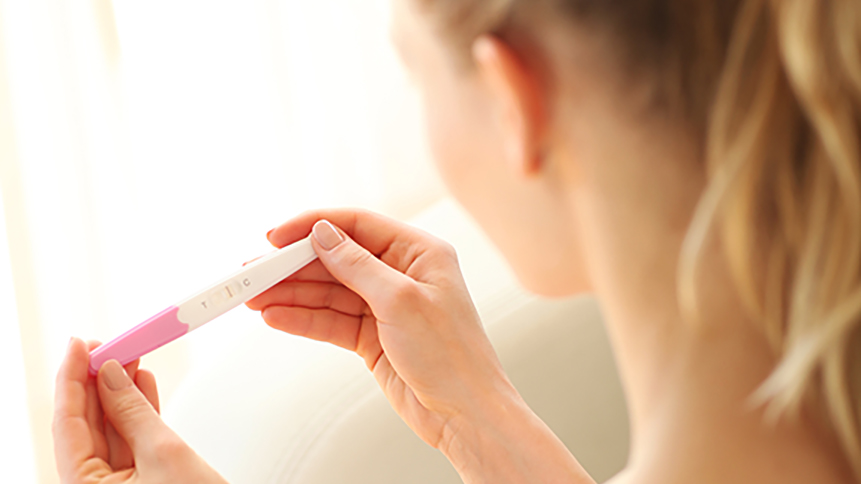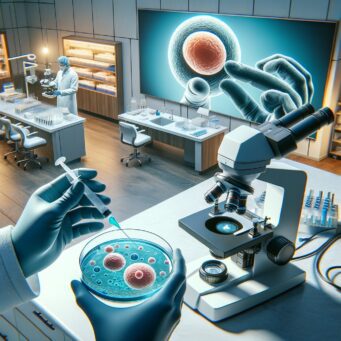
Infertility treatment is difficult. The challenges, in some ways, remain the same from person to person and couple to couple: the battles with insurance, the strains on a relationship, the uncertainty of a happy ending. But each of us lands at the fertility clinic for different reasons, and that’s where our difficulties diverge. For the pair sitting on the blue waiting room couch, an unknown genetic issue has surfaced; for the woman leaving the doctor’s office with downcast eyes, she may fear she’s waited too long, that it’s too late; for the young couple walking into the billing department, they may have just learned that they’ll need to pay for IVF out of pocket. For me, it was anorexia.
My anorexia first surfaced when I was eleven years old, landing me in the hospital during the Christmas and New Year’s break of sixth grade. In the decades since then, it’s been a constant presence, albeit sometimes stronger than others. There were years where my weight stayed stable and close to a normal weight, and others where I bounced from outpatient programs to residential programs, barely functioning.
Never, during those decades, did I get my period without the artificial hormones of birth control; and always, during that time, was I terrified that I wouldn’t be able to have kids when the time came.
At 31, a few months into my marriage, I found a fertility doctor who was recommended by the National Association of Eating Disorders, and made an appointment. A week later, my husband and I made the trek up to the Upper West Side from Brooklyn and began the fertility treatment process.
No two fertility treatment experiences can be compared. The process is challenging for everyone, and no woman can say whether her experience is easier or more difficult than that of another woman. But my history of an eating disorder created a set of unique circumstances that added to fertility treatment’s innate challenges. Here are 6 ways that my anorexia made my fertility journey challenging:
The physical demands were more taxing.
Fertility treatments do a number on your body. From the hormones messing with your system to the constant trips to the phlebotomist, you’re asking your body to do quite a lot. It’s extra important that you take care of your body by nourishing it properly and resting. My eating disorder did not permit me to do either of these things.
On the countless early mornings that I went to the clinic for monitoring, I would take that long subway ride on an empty stomach, become dizzy as I got my blood drawn, and then battle feeling faint on the ride home. On more than one occasion, I went directly from monitoring to the gym, trying to ignore both my physical weakness and the big wad of bloody gauze in the crook of my elbow as my sneakers pounded the treadmill.
The bloat messed with my head.
One of the loveliest parts of fertility treatment is all of the side effects that go along with various fertility drugs. For me, those drugs were Clomid (to promote follicle growth), Ovidrel (to trigger ovulation), and Endometrin (to thicken the uterine lining to encourage implantation), all of which cause bloating and water weight gain. So much of an eating disorder is about having control of your body, and it was tough enough to grapple with the fact that my ability to have a child was out of my control. Add to that the feeling that my body was ballooning — regardless of what I ate or drank or how much I exercised — and I felt truly panicked. My body, which had been an obedient servant for years, was now a stranger and antagonist, and there was no escaping it.
No two fertility treatment experiences can be compared. The process is challenging for everyone, and no woman can say whether her experience is easier or more difficult than that of another woman. But my history of an eating disorder created a set of unique circumstances that added to fertility treatment’s innate challenges.
There was an added layer of isolation.
Going through fertility treatment can be very difficult on a couple. Though both parties are involved, it’s usually the woman who bears the brunt of the process, and the fact that the responsibility can’t be shared with or fully understood by the other person can lead to a deep sense of alienation. Eating disorders create their own sense of isolation, as the afflicted retreats deep inside their disease and away from loved ones. With these two factors combined, the sense of aloneness I felt was profound. My husband, try as he might, could understand neither my anorexia nor what it’s like to have a body that won’t perform what’s often described as its most natural function.
I constantly worried that I was sabotaging the whole thing.
My doctor assured me that the drugs were all that mattered, that there was nothing, behavior-wise, that I could do or not do to impact my chances of becoming pregnant. He said that what I ate or how much I exercised wasn’t important, would make no difference. I took in his words and understood the science as he explained it — but still, I didn’t believe him. Intuitively, I felt that my food restriction and rigorous exercise routine made my body an inhospitable place for a new life to take hold. But, without explicit instructions from the doctor to do otherwise, the disease demanded that I stick to my predetermined calorie count and workout regimen, which meant that, throughout all eight months of our treatment, I had a nagging fear that my own daily actions were sabotaging our efforts.
I could identify, concretely, the ways in which I’d caused this.
A lot of women and couples don’t know why they can’t conceive, or are given a diagnosis of a medical condition that’s completely beyond their control. In my particular case, I could look back at my life and clearly see the things I’d done to lead me to these circumstances; I’d known, even when I was doing these things — skipping meals, exercising constantly, taking sleeping pills to escape my hunger — that they could affect my future fertility, and I did them anyway. I know that an eating disorder is a disease, and one that I didn’t choose, but on some level, it was difficult to see my behavior as outside of my control. Throughout all my fertility treatment, I mentally beat myself up over my previous choices, and deeply feared the guilt that would descend if I was never able to get pregnant.
I began to view my body in a different way, as a vessel for a child, rather than a collection of flesh to be shaped and controlled. I was able to focus on the process, on obeying the doctor’s orders, and on listening to my body more closely than I ever had before.
I didn’t think I deserved it.
Because I felt that I’d brought this upon myself, I had trouble believing that I deserved a happy outcome. The others I knew who struggled with fertility, it seemed to me, had lived so virtuously, had done nothing to cause their own challenges, and it felt only fair that they should succeed while I failed. After all, I’d prioritized myself — my need to be thin, to obey my compulsions — over my future family. I understood, on a logical level, that I actually hadn’t been in control, that the disease was at fault, not me. But still, I felt a deep guilt when I saw other women at the clinic or spoke with acquaintances about fertility treatment. You deserve a baby, I would think. I don’t.
Regardless of whether I felt I deserved it, I got my happy ending. After seven failed cycles of Clomid + Ovidrel + Endometrin + timed intercourse, we decided to try one IUI — though the doctor emphasized that, since my partner’s sperm wasn’t the issue, the IUI wouldn’t really address whatever issue was preventing me from becoming pregnant — before proceeding to IVF. Miraculously, it worked. As I write this, I’m 37 weeks pregnant with a little girl.
My fertility journey was challenging, and made all the more difficult by my eating disorder. But in certain ways, I was relieved: the thing I’d feared for so long was finally happening, and I wouldn’t have to worry or wonder about it anymore.
At the same time, I began to view my body in a different way, as a vessel for a child, rather than a collection of flesh to be shaped and controlled. I was able to focus on the process, on obeying the doctor’s orders, and on listening to my body more closely than I ever had before. This streamlined focus allowed me to move forward despite how difficult it was at times.
My main coping mechanisms, besides talking myself through it and working to get into the right mindset, were to keep myself very busy, to talk openly about my fertility treatment with friends, and, to be totally honest—a little wine!
Today, those challenges have faded to sad, fuzzy memories from a lifetime ago, replaced by the sharp, joyful reality of my baby kicking my ribcage.
Of course, new challenges are on the horizon: once this baby is born, my anorexia is sure to present a different set of hurdles that add to the difficulties of parenthood. But, as with the first part of this journey, I understand that each of us faces a unique set of circumstances on the road to having and raising a child. Mine may be different from the norm, but they’re no more or less than anyone else’s, and they’re certainly no more than I can handle. And if I stay the course and do the work, I may be lucky enough to have another happy ending.
Contributor
Kate Willsky
Kate Willsky is a freelance writer based in Sacramento via Brooklyn via San Francisco. Her work has appeared in SELF, Eater, Vice, and Food52, among other publications. After a year of fertility treatment, she’s expecting her first child this spring.

Listen to stories, share your own, and get feedback from the community.


















